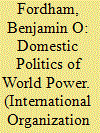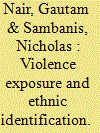|
|
|
Sort Order |
|
|
|
Items / Page
|
|
|
|
|
|
|
| Srl | Item |
| 1 |
ID:
165165


|
|
|
|
|
| Summary/Abstract |
How do periods of conflict and peace shape women's empowerment around the world? While existing studies have demonstrated that gender inequalities contribute to the propensity for armed conflict, we consider how the anticipation and realization of armed conflict shape women's opportunities for influence in society. Some scholars have pointed to the role that militarization and threat play in entrenching male dominance, while others have argued that periods of warfare can upend existing gender hierarchical orders. We posit mechanisms by which the preparation for and experiences during war affect change in women's empowerment. We develop and test observable implications using cross-national data from 1900 to 2015. We find that, at least in the short and medium term, warfare can disrupt social institutions and lead to an increase in women's empowerment via mechanisms related to role shifts across society and political shifts catalyzed by war. Reforming institutions and mainstreaming gender during peace processes stand to have important legacies for gender power relations in postconflict societies, though much more may be needed for more permanent change.
|
|
|
|
|
|
|
|
|
|
|
|
|
|
|
|
| 2 |
ID:
165166


|
|
|
|
|
| Summary/Abstract |
When and where do states coercively alter their internal demography? We build a theory that predicts under what conditions states alter the demographic “facts on the ground” by resettling and expelling ethno-national populations. We predict that, under particular scope conditions, states will employ demographic engineering to shore up control over (1) nonnatural frontiers, and (2) areas populated by ethnic minorities who are co-ethnics with elites in a hostile power. We then substantiate our predictions using new subnational data from both China and the USSR. Causally identifying the spatially differential effect of international conflict on demographic engineering via a difference-in-differences design, we find that the Sino-Soviet split (1959–1982) led to a disproportionate increase in the expulsion of ethnic Russians and resettlement of ethnic Han in Chinese border areas lacking a natural border with the USSR, and that resettlement was targeted at areas populated by ethnic Russians. On the Soviet side, we similarly find that the Sino-Soviet split led to a significant increase in expulsion of Chinese and the resettlement of Russians in border areas, and that resettlement was targeted at areas populated by more Chinese. We develop the nascent field of political demography by advancing our theoretical and empirical understanding of when, where, and to whom states seek to effect demographic change. By demonstrating that both ethnic group concentration and dispersion across borders are endogenous to international conflict, our results complicate a large and influential literature linking ethnic demography to conflict.
|
|
|
|
|
|
|
|
|
|
|
|
|
|
|
|
| 3 |
ID:
165169


|
|
|
|
|
| Summary/Abstract |
While extensive research shows that policies and institutions spread across states through processes of diffusion, we know little about diffusion among international organizations (IOs). We develop a novel approach for the study of diffusion among IOs. This approach consists of three components: a theoretical focus on connectivity among IOs as pathways for diffusion; a conceptual differentiation between alternative types of convergence effects; and a methodological strategy combining dyadic and spatial analysis of diffusion. We illustrate the usefulness of this approach through an empirical case: the diffusion of participatory governance arrangements among IOs from 1970 to 2010. The analysis shows that connectivity among IOs contributes to convergence, which typically is manifested through imitation of very specific institutional models. The article's findings have implications both for the study of IOs and for the general study of diffusion.
|
|
|
|
|
|
|
|
|
|
|
|
|
|
|
|
| 4 |
ID:
165170


|
|
|
|
|
| Summary/Abstract |
The United States' 1890–91 decision to begin building a battleship fleet, an important point in its development as a world power, can illuminate the domestic sources of foreign policy ambition. An analysis of roll-call votes in the House of Representatives indicates that socioeconomic divisions arising from industrialization strongly influenced support and opposition to the battleship fleet. This relationship worked mainly through trade policy interests: members of Congress from import-competing states tended to support the effort, while those from export-oriented states tended to oppose it. The patriotic symbolism of battleships at a time of labor unrest also helped motivate support for the program, though evidence of this pattern is less conclusive. Although party affiliation was crucial, it was also partly a function of economic structure, which shaped the two parties’ electoral fortunes. The impact of trade interests during this period is a mirror image of what previous research has found concerning the post-World War II era, when export-oriented interests tended to support American global activism and import-competing interests to oppose it. The reason for the difference is the Republican Party's commitment to trade protection, which strongly influenced both the goals of the policy and the identity of its supporters.
|
|
|
|
|
|
|
|
|
|
|
|
|
|
|
|
| 5 |
ID:
165171


|
|
|
|
|
| Summary/Abstract |
Gender stereotypes—stylized expectations of individuals’ traits and capabilities based on their gender—may affect the behavior of diplomats and the processes of international negotiations. In a survey experiment in the Council of the European Union, we find that female representatives behaving stereotypically weak and vulnerable may trigger a chivalry reaction among male representatives, increasing the likelihood that the men will agree to support a bargaining proposal from the women. The effect is conditional on the negotiators’ cultural background—the chivalry reaction is displayed mainly by diplomats from countries with relatively low levels of gender equality. Our study contributes to the research on nonstandard behavior in international relations, and in particular the expression and reception of emotions in diplomacy. We argue that gender stereotypes may have a moderating impact on decision making based on such intuitive cognitive processes. We also add to the broader negotiation literature, both by showing the pervasiveness of gender stereotyping, and by testing at the elite level the generalizability of claims regarding gender effects derived from laboratory experiments. Overall, our findings demonstrate the importance of bringing gender into the study of international negotiations, where it has been largely and surprisingly ignored.
|
|
|
|
|
|
|
|
|
|
|
|
|
|
|
|
| 6 |
ID:
165172


|
|
|
| 7 |
ID:
165168


|
|
|
|
|
| Summary/Abstract |
What are the effects of international intervention on the rule of law after civil war? Rule of law requires not only that state authorities abide by legal limits on their power, but also that citizens rely on state laws and institutions to adjudicate disputes. Using an original survey and list experiment in Liberia, I show that exposure to the UN Mission in Liberia (UNMIL) increased citizens’ reliance on state over nonstate authorities to resolve the most serious incidents of crime and violence, and increased nonstate authorities’ reliance on legal over illegal mechanisms of dispute resolution. I use multiple identification strategies to support a causal interpretation of these results, including an instrumental variables strategy that leverages plausibly exogenous variation in the distribution of UNMIL personnel induced by the killing of seven peacekeepers in neighboring Côte d'Ivoire. My results are still detectable two years later, even in communities that report no further exposure to peacekeepers. I also find that exposure to UNMIL did not mitigate and may in fact have exacerbated citizens’ perceptions of state corruption and bias in the short term, but that these apparently adverse effects dissipated over time. I conclude by discussing implications of these complex but overall beneficial effects.
|
|
|
|
|
|
|
|
|
|
|
|
|
|
|
|
| 8 |
ID:
165167


|
|
|
|
|
| Summary/Abstract |
This article studies the conditions that lead peripheral minorities to identify with the state, their ethnic group, or neighboring countries. We contribute to research on separatism and irredentism by examining how violence, psychological distance, and national status determine identification. The analysis uses data from a novel experiment that randomized videos of actual violence in a large, representative survey of the Kashmir Valley region in the Indian state of Jammu and Kashmir, an enduring site of separatist and irredentist conflict. We find that a strong regional identity is a counterweight to irredentism, but violent repression by the state can push members of the minority to identify with an irredentist neighbor. Violence increases perceived distance from the nation and reduces national identification. There is suggestive evidence that these effects are concentrated among individuals with attributes that otherwise predict higher levels of identification with the state. Information about integrative institutions and increased national status brought about by economic growth is insufficient to induce national identification in a context where psychological distance from the nation is large.
|
|
|
|
|
|
|
|
|
|
|
|
|
|
|
|
|
|
|
|
|